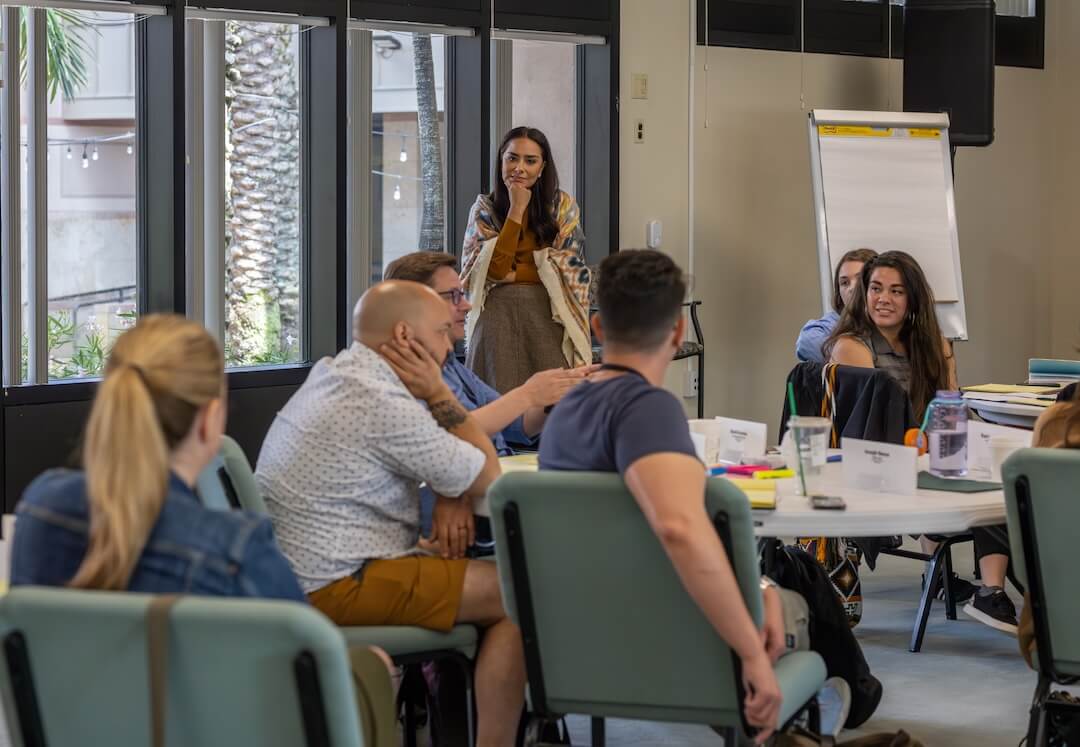I started a new chapter this week. I’m now the managing editor at Vice, and I’m thrilled to have the opportunity to work with talented journalists and editors who have an incredible vision to grow this news brand.
There’s a lot of excitement around new jobs, especially ones with shiny titles. But the Job Fairy didn’t slip an offer letter under my pillow one night. For months, I applied and interviewed and had lots of conversations about what was best for me and what the newsroom really needed. I put myself out there because I knew it was time to move on.
After plenty of soul-searching and talking to trusted colleagues and friends, I decided to look for new opportunities because my frustrations were part of a pattern I accepted I could not change. As the responsibilities of my role changed, the job stopped making sense for me. I wasn’t getting closer to my career goals. I continued to try to do the best work I could, but once I determined I needed to leave, it was easier to deal with the challenges. I was able to take a breath and understand this was temporary.
I spent a lot of time thinking about what the right next move was (and if you feel stuck on this, I highly recommend looking at Millie Tran’s guide). In the past, I’ve thought a lot about job titles and salary figures, but this time around, I focused in on how I wanted my job to make me feel. I wanted to wake up excited to go to work — most days, at least. I wanted to feel like I was making an impact. I wanted to have a voice to share ideas and a seat at the table to figure out how we would solve problems. Having a somewhat clear idea of what I was looking for helped me seek out the right opportunities and ask better questions during the interviews to figure out if the work environment was going to be a good fit.
I had the luxury of carefully considering what was next because I live in one of the country’s few journalism hubs. I could informally grab coffee with editors without booking a flight and know that if I turned down a role, there would be more opportunities that wouldn’t require me to break my lease. A couple of years ago, this was really frustrating for me when I was job searching from Miami, as the roles seemed to always go to someone who already lived in the city. For journalists living outside of the hubs, especially those working in local media, this process is even harder.
Last year, I wrote about all the problems we need to fix when it comes to hiring within the journalism industry, and I faced a lot of the same challenges this time around. Because I had been through it before and heard from many women who experienced the similar setbacks, I was able to have more of plan in place to keep the faith through the long process of interviewing. I asked more questions and allowed myself to bow out of opportunities that weren’t the right fit. When I was rejected, I cut myself slack and treated myself to my favorite foods and TV shows.
I leaned on a lot of people during this transition, learning from women who had been through this before. I asked some of them to share their experiences of knowing when to leave a role:
“Taking the leap and deciding to leave a job is both terrifying and exciting and generally comes after a lot of soul-searching. A few questions I’ve thought long and hard about: Am I still learning? Am I still challenged? Am I still growing in this job? Is this how I want to be spending my days? Do I feel like I am making an impact here, and that I can continue to make an impact here? Am I happy and excited about at least half the work I’m doing? There are always parts of jobs we hate, in all jobs, and that’s fine. But if you aren’t enjoying the bulk of what you’re doing, then that’s a problem. If the answer to a few of these questions is no, it’s time to change something. If I can’t change enough within my own job, then it’s time to start thinking about what’s next.” — Masuma Ahuja
“As priorities changed in my 30s, I realized that work needed to suit my life as much as my bank account. Getting pregnant made me evaluate how I wanted family and a fulfilling work life to look. So I found a new job. Within two years, I switched to a newsroom-adjacent role, in part for the flexibility to juggle life and a progressing career. Every so often, you just need to stop and think about where you are, where you want to be and how those can converge. Where you go from there is up to you.” — Kari Cobham
“Before I decided to leave my last job, I had to first learn the difference between just feeling dissatisfied with your specific responsibilities and being at the point where you need to move on. I got to the point where I was ready to leave by discussing the issues I was having with a supportive group of friends in the industry. I realized that not only was my role something I wasn't passionate about, but I also had no managerial support and no room to grow. I could not be happier with the decision to make a change. If you're unhappy with your specific responsibilities, pitch a plan to structure your job a little differently. If your ideas are well-received, that could make the difference between staying and going.” — Delaney Ross
“When I was 23, I had my dream job as a local news reporter at my hometown paper. After doing a short stint as a web producer and social media evangelist, I realized I wanted to do more of that work. This came as quite a shock because my one and only goal since age 15 had been to become a local news reporter. Through some tough conversations with my partner, my friends, my mentors, I realized that maybe my future didn't lie in traditional beat reporting. When I looked around the newsroom, the jobs I wanted to tackle in two years, in five years, in 10 years were digital ones. I started applying anywhere and everywhere that had ‘digital editor’ in the title. I landed at a small, regional cooking magazine where I was one of three staff members. It was a good way for me to start fresh and learn to manage the full breadth of a digital product. I've always been grateful for that leap of faith I took because it taught me how to view a situation not for its prestige and its Big Name Title, but to really dig deep and think about what kind of work I wanted to be doing. ” — Emma Carew Grovum
I am excited to get started at Vice, and ultimately, I am thankful for this process, even though it was discouraging at times. It helped me zero in on what is important to me, and I’m looking forward to incorporating that into this next chapter.
Things Worth Reading
-
These beautiful and functional resume templates you can download.
-
The problem with saying "women of color" when we're specifically discussing Black women.
-
Hollywood can’t stop writing female journalists who sleep with their bosses and sources.
-
A study shows that office wellness programs have little effect on employee health.
-
We should take time to mourn career transitions.
-
24 thoughtful gifts for your ride-or-die work wives.
-
Rebekah Monson’s Ted talk on millennials, policy makers and the collaborative promise of local media.
Do Your Homework
One of the best pieces of advice I received while preparing for this career transition was to make a list of the people who should find out about the switch directly from me. This can apply to anything professionally or personally that you might announce on social media. Who deserves an in-person conversation, email or text before the news gets posted? Thinking about this ahead of time allowed me to be less frantic once the offer letter was signed.
Focus on the Work
CNN received a long-term reporting grant from the European Journalism Centre to put a spotlight on gender inequality and women’s health in the world’s least developed nations. The As Equals project includes exclusive reporting, videos, data-driven features, reader submissions, photo essays, opinion pieces and other audio-visual components.
Project coordinator Eliza Mackintosh said As Equals has made serious impact.
“We’ve been thrilled to support female freelance journalists covering women’s rights globally as part of the series,” she said. “We’ve also used As Equals as an opportunity to highlight lesser heard women’s voices. Our op-ed series has featured writing on empowerment, education, and feminism from women in Malawi, Yemen, Liberia, and elsewhere.”






